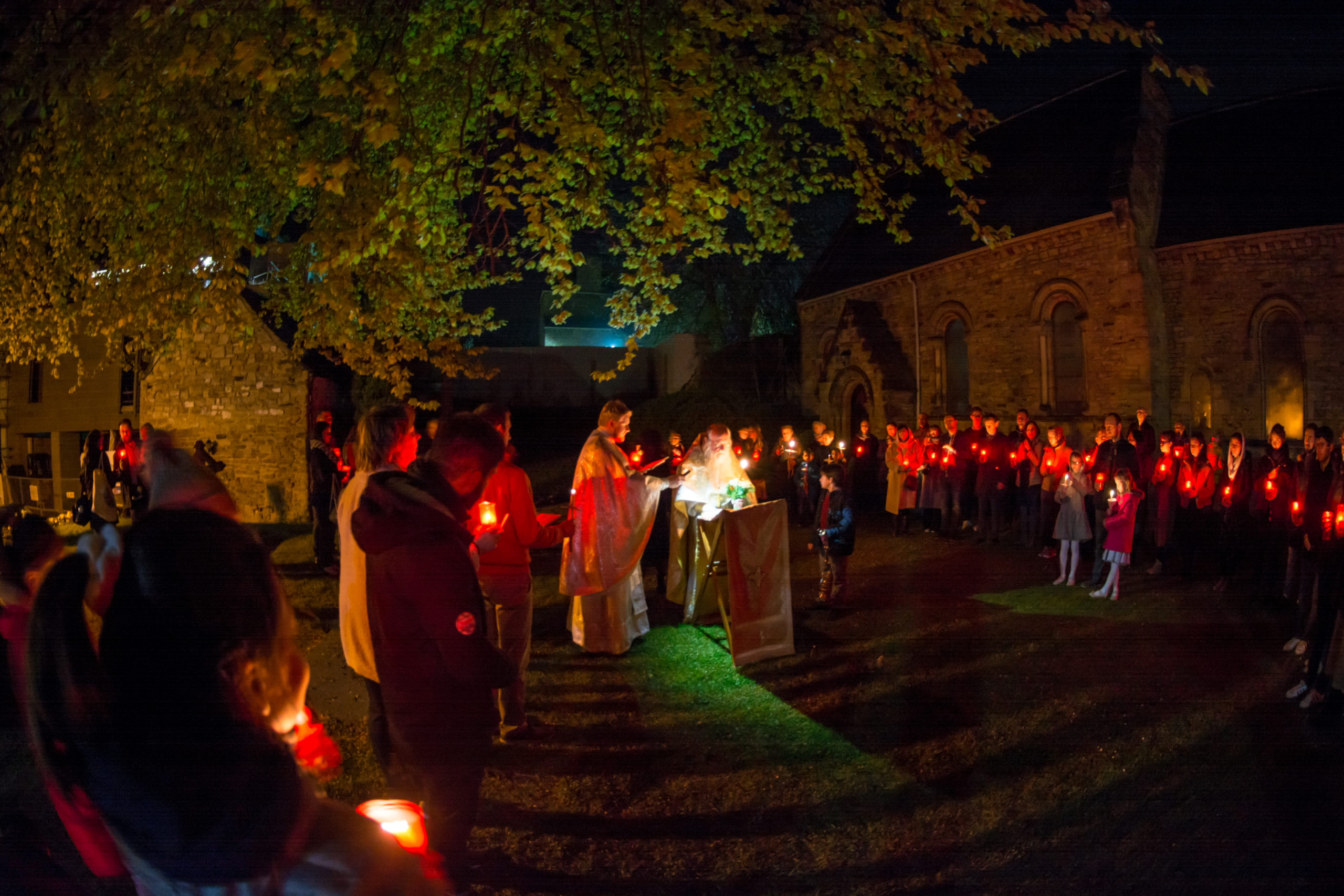Several people have asked about Orthodox belief in the afterlife, and prayer for the departed.
- Do we all go temporarily to an afterlife that is neither heaven nor hell, awaiting the final resurrection?
I think we have first to ask what we think we mean by talking about ‘going temporarily to an afterlife…, awaiting the final resurrection’. I think that we all too easily think we know what we are talking about, and so we imagine a temporal sequence: this life, the afterlife, the final judgment, and then an eternity in heaven or hell. This means that we think of the departed as experiencing time much as we do; that they are passing through time like us. But to think like that is to make a lot of questionable assumptions. It is as if we think that time is a kind of universal measure of sequence, as if the departed are still in much the same time zone as ourselves, only the other side of some kind of barrier. But that is quite unlikely: time is not a universal measure, existing independently; time is bound up with life as we know it; duration, the temporal sequence that we live through, is intimately bound up with the life that we live in this world. The dead are no longer part of a world characterized by time as we experience it. We don’t know what their experience of time and succession is. Our experience of time is bound up with the world we know through our bodies; the departed are, as the Church liturgy puts it, ‘souls’, no longer embodied, what their experience is like is something we can only imagine. And it is dangerous to put too much trust in what we imagine. It is better to say that we do not know; we have no idea of the geography and history of the afterlife. All we know is this: that when we are dead, we do not pass beyond God’s loving care for us, and more than that, we know, as Christians, that the significance of death has been radically changed through Christ’s encountering death on the Cross, and in dying, not succumbing to death, but instead conquering death. Death is now defeated; the impression that death gives that it ends everything, that hope is extinguished—is no more than a false impression. But how we spell out what that means for life after death is something that we really know very little about. You will probably know that we Orthodox make a great deal about the first forty days after death, having memorial services (panikhida, the Russians call them; Trisagion services, or just memorial services, mnemosynai, the Greeks) on the third, the ninth, and the fortieth days, but when I explain what this means to people who ask, I talk about the stages of our mourning: the early days of acute memory, feeling their loss, and sometimes our regret; then there follows a week or so of getting used to our loss, then, up to the fortieth day, when we come to terms of how they are now—confident that they are in the hands of God. What I do not suggest is that the departed souls are going through a sequence of events, of which we have some knowledge, during those forty days (though I know there are popular beliefs to that effect—which have had remarkably little impact on our services for the dead, for they have no basis in the Scriptures, and precious little in the Fathers).
So, the answer to your first question is that we don’t know—it has not been revealed to us—what happens after death. All we can be sure of is that the departed are dead. The funeral service is quite blunt about this, putting this verse on the lips of the departed:
I weep and I lament when I come face to face with death; and see lying in the graves our beauty, which was made in the image of God, disfigured, inglorious, all its form destroyed. How strange, indeed, that this lamentable mystery should happen to us. How we gave in to corruption, and became partners with death? Indeed, as written, by the command of God, who grants to all the departed eternal rest.
There is no fudging there: the dead are dead, no longer part of the land of the living. But we also know that death has been conquered by the Resurrection of Christ. So we succumb to corruption, but know that this is not the last word, the whole story. To quote again from the funeral service:
I am an image of your ineffable glory, though I bear the scars of my transgressions. Take pity on your creature, O Master, and cleanse me in your loving-kindness. Grant me the fatherland for which I long, making me once more a citizen of Paradise.
The departed could be said to be waiting: waiting for the coming of Christ and his transfiguration of the created world—the ‘new heavens and new earth’ of which the Apocalypse speaks… and a new time, a time which is more like an eternal present, than the constant running away of time as we experience it now. Where are they, the departed, waiting? What, indeed, does it mean for them to ‘wait’? We don’t know, save that they are in the hands of God.
2. What about those who die full of sin, those who do not believe, but have never had the chance to belief? Can they go to heaven? Can we pray for them?
The first thing to grasp is that God in Christ came to save the whole world; in overcoming death on the Cross he opened a way to the resurrection of the dead for all. ALL: ‘our saviour God, who wills all to be saved and come to a knowledge of the truth’ (I Tim. 2: 4). Christians have made so much of passages in the Gospels and the rest of the New Testament that speak of an alternative fate: those verses in Jesus’ teaching where he speaks of outer darkness, and eternal fire, and weeping and gnashing of teeth, overlooking the fact that there are far more places that speak of God’s will to save all, and of Christ’s coming to save all. That must be where we start from: God’s will to save everyone—a will that is founded in his love, the love that is his eternal being, and the love that God has shown and shows for us, without which we would simply not exist. What then about hell? If heaven means (rather than is a place where) we come to a full experience of God’s love, it must also mean the experience of being loved by God which is what we most really, deeply want. We find ourselves in heaven, loved by God, and delighting that we are loved by God. Is it possible to imagine that someone might find himself in the presence of God’s love and feel embarrassed, angry, ashamed, burning with fury? Someone who has, in the course of his life, always turned away from love, always rejected it—both rejected love offered, and also refused to love himself. So that he can no longer love, no longer respond to love, hates the very idea that he might. To my view, that would be hell: to realize God’s love and yet know that you could never accept it or respond to it. To realize, in a way, that you are wrong, that the way you have lived your life is wrong, that the repentance needed of you to respond to God’s love would be to deny all the lights by which you have lived in this life (or, more truly, to acknowledge that you have lived your life in a darkness that you have wrapped about yourself, a darkness that you have made as dense as possible, by shutting out the least ray of light). The question is, I think: is that conceivable? Is it conceivable that one could never respond to God’s love, even if we have never done so in our earthly life? That we can, in this way, defeat God’s love—defeat God and his love? At the very least, I think we must embrace the hope that everyone, the whole creation, will in the end respond to God’s love. And hope, of course, has no place in hell (remember the words written on the lintel of Dante’s Inferno: Lasciate ogni speranza, voi ch’entrate! Abandon all hope, you who enter!).
That is, it seems to me, one side to the answer to your question. The other side is this. We know that we can pray for the departed: we pray for the departed in most of our litanies, in every liturgy we pray for the departed. And if we pray, we must believe that it makes sense to pray for them—which means that our prayers can benefit the departed. Some say that we can only pray for the Orthodox departed, but I don’t believe that: we can pray for all, living and departed; there should be no limit to our prayer, just as there can be no limit to our hope, not, that is, if we are seeking to be ‘perfect, as your Father in heaven is perfect’. Sometimes we do indeed find it difficult to pray for others, just as we sometimes find it difficult to forgive. But then we know that we need to struggle with ourselves: if no one can fall outside God’s love, then we should struggle to see that no one falls outside our love and forgiveness. When we get to Pentecost, at the Vespers of Kneeling, in those three long prayers, we pray for everyone, even at one point beseeching God, ‘who has deigned on this final and saving festival to receive prayers and supplications for those bound in Hades, granting great hopes to us that relaxation and refreshment shall be sent down from You to those bound by these grievous bonds’. Even those bound fast in hell are among those for whom we can and must pray. Praying for someone who has always rejected the Faith, has even said that they do not believe in God? Can we pray for them? Does it make sense to pray for them? For someone who has been quite clear that they do not believe in God, that they are atheists. I think the first question that occurs to me when someone says that they do not believe is God is: what God is it that they don’t believe in? (Sometimes, too, I find myself asking myself about those who do believe: what God is it they believe in?) Some atheists profoundly disbelieve in some sort of transcendent tyrant, who torments those he has created. It seems to me it would be better not to believe in such a caricature of the God whom we believe, as Christians, to be love. Maybe, ‘after’ this life, whatever that means, they will come to glimpse something of love of the God they didn’t believe in, because they always thought that God was something else. Maybe they will come to see something of the love of God—something they never thought God was (and one might ask why not? and find answers in the way some who do believe in God behave)—and come, too, not to reject it, but gradually begin to accept it and respond. If that happens, she or he will change; they will be different from the people we thought we knew during their lifetime. We can, I think, be sure that all that we loved in them will continue, even more deeply, but the barriers they put up to accepting with their mind a God who loves—these barriers will weaken. We can pray for that, and pray knowing that our prayers will be helping in that process.

